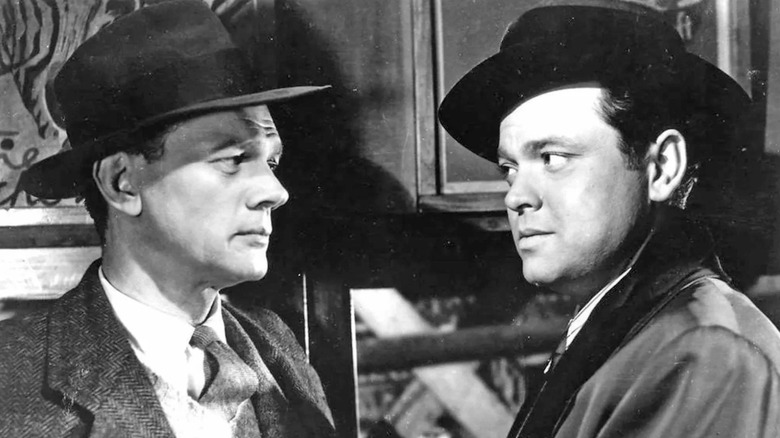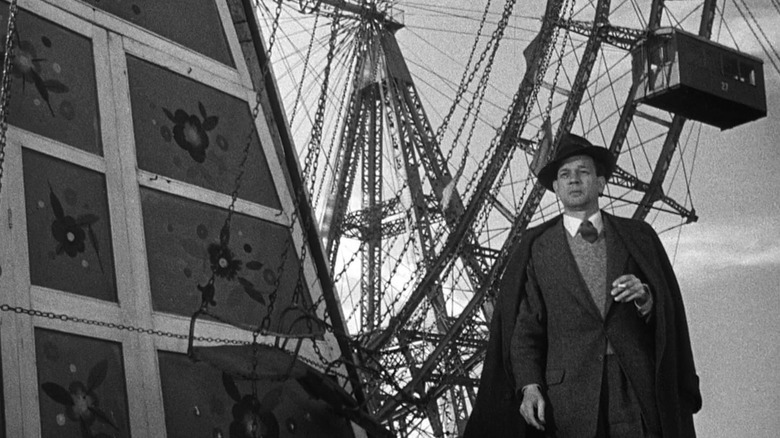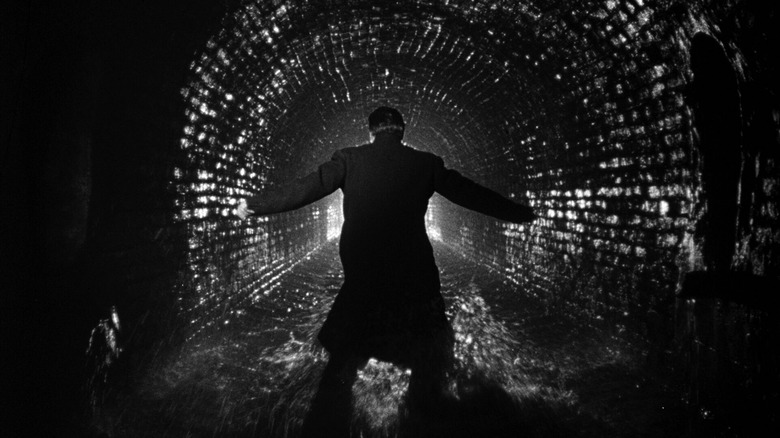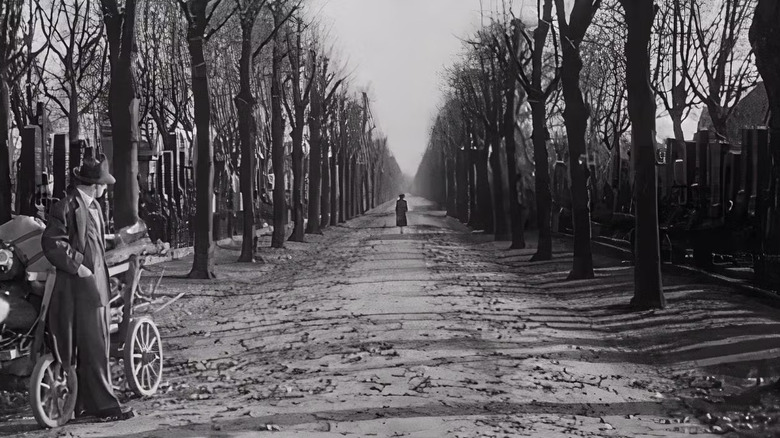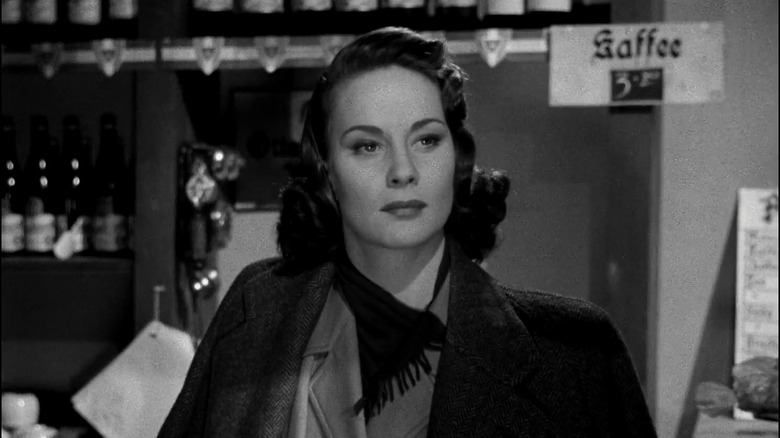The Third Man Ending Explained: Fated To Walk Alone
We may receive a commission on purchases made from links.
Vienna may be the city of Mozart, Mahler, Strauss, and Beethoven, but it's the music of a lesser-known composer that is most often heard on its heavily-touristed streets. Anton Karas was Viennese-born, and his jaunty, sinister theme to "The Third Man" provides a strange accompaniment to all the snapshots and selfies, played by buskers and tinkling from music boxes in souvenir shops.
The modern Austrian capital has come a long way from the rubble-strewn, shadow-haunted city that provided such an evocative backdrop when British director Carol Reed and his cast and crew arrived in late 1948 to shoot their seminal tale of post-war black market intrigue and doomed romance. /Film ranked "The Third Man" among our top 100 movies of all time, and Reed's masterpiece matches the elusive tone of Karas's unforgettable zither score: It's simultaneously humorous, sorrowful, and sinister, casting Joseph Cotten's hapless protagonist into a murky labyrinth of tilted streets and shadowy passageways, the city's off-kilter otherworldliness captured by Robert Krasker's incredible expressionistic camerawork.
"The Third Man" is perhaps best known for Orson Welles' legendary "Cuckoo Clock" speech, and movie buffs can enjoy reciting his words while riding Vienna's landmark ferris wheel that still turns slowly above the Prater. Elsewhere in the city, you can lurk in the doorway at Schreyvogelgasse 8, where Welles made his famous entrance as Harry Lime in the film, or head to the Vienna Central Cemetery (Zentralfriedhof), where Reed signed off with his disputed but absolutely perfect downbeat conclusion. A more typical thriller might have ended right after Lime gets his comeuppance, but Carol Reed had something far more fatalistic in mind. Let's take a look at how the ending of "The Third Man" plays out and what it all means.
What you need to remember about The Third Man
Vienna was left in a bombed-out and impoverished state after World War II. In the aftermath of the conflict, the Austrian capital was divided into four quarters occupied by each of the Allied victors: Britain, United States, the Soviet Union, and France, with the central first district designated as an inter-allied zone. As in other major European cities like London and Paris, the black market had become an unsavory necessity for people struggling to make ends meet, and criminals profited from selling everything from illicit groceries to booze, cigarettes, and nylon stockings. In post-war Vienna, there was a dire need for the new wonder-drug, penicillin, and black marketeers rushed to fill the gap, stealing supplies from hospitals, diluting the formula with other substances, and even selling dangerous counterfeit products.
This is the situation that greets Holly Martins (Joseph Cotten), a pulp western novelist, at the beginning of "The Third Man." He arrives in Vienna with the promise of a job from his friend Harry Lime (Welles), but discovers he's too late — Lime was knocked down by a car outside his apartment and killed. At the funeral, Martins meets Major Calloway (Trevor Howard) and Sergeant Payne (Bernard Lee) of the British military police, who had an interest in Lime because of his black market activities, which Martins knew nothing about.
In no mood to see his friend's name dragged through the mud, Martins sets out to investigate Lime's death. His inquiries lead him to Lime's lover, Anna (Alida Valli), and several underworld characters who were present at the scene of Lime's unfortunate demise. Fed up with Martins' meddling, Calloway eventually shows him evidence of Lime's criminal enterprise. Anna finds out too, but that doesn't change her feelings — she still adores the charismatic racketeer. But Lime is not as dead as the authorities believe, and it's not long before he breaks cover and reaches out to his old buddy.
What happens at the end of The Third Man
Rarely has a movie revolved so heavily around an offscreen character as "The Third Man." Just about every conversation is about Lime and his nefarious activities, setting the stage for one of the greatest screen entrances in cinema history. Over an hour into the film, we finally get a look at Orson Welles as one of his best characters, smirking devilishly at Martins from a darkened doorway before vanishing again.
Martins reports the sighting to Calloway, who has Lime's grave dug up to reveal another man in his coffin. Meanwhile, Anna is wanted for interrogation by the Russian authorities for holding a forged passport. Martins arranges a daytime meeting with his friend and finds out that Lime himself gave up Anna to the Russians. Lime is unrepentant about the death and suffering his dodgy drugs have caused, waxing philosophical about the futility of compassion before launching into the "Cuckoo Clock" speech.
Martins agrees to help Calloway catch Lime on one condition: That he arranges safe passage from the city for Anna. Ever loyal to Lime, she refuses when she realizes that her escape is part of a deal to apprehend her lover and send him to the gallows. Martins decides to head back to the United States, but Calloway appeals to his conscience by showing him Lime's victims in a children's hospital.
This leads to a thrilling chase through the sewers of Vienna, where Welles added some genius improv to one of the film's most famous scenes. His off-the-cuff reaction to Carol Reed's direction resulted in the indelible image of Lime silhouetted in a subterranean tunnel as the authorities close in. A shootout ensues; Sergeant Payne is killed and Lime is wounded by Calloway, leaving it to Martins to put his former pal out of his misery and spare him from execution.
The Third Man almost had a happy ending
With Harry Lime now truly dead, "The Third Man" draws to a close at his real funeral and concludes with a stunning single-take shot. Martins, now hopelessly in love with Anna, makes one attempt to win her heart. Asking Calloway to drop him off, he leans against an old wagon and waits for the longest time as she approaches along the cemetery road on foot. This is the moment in old Hollywood movies when the hero usually gets the girl, but Carol Reed had a better idea — she cannot forgive Martins for betraying Lime and walks past him without a glance.
This was a major departure from Graham Greene's original film treatment, written by the author as a novella to nail down the details and atmosphere before developing it into a full screenplay. Greene wrapped things up with a happy ending as Martins and Anna walk away arm-in-arm after Lime's funeral. To him, "The Third Man" was just a light-hearted thriller that wouldn't bear the weight of an unhappy ending. Producer David O. Selznick also preferred Greene's standard romantic conclusion, but Carol Reed stuck to his guns by arguing that the pair getting together straight after Lime's death might strike audiences as "unpleasantly cynical."
Greene also had concerns about the length of final the shot, reasoning that many viewers wouldn't stick around for its duration. Lasting over a minute with the score playing us out, he felt they might assume the movie would end in the conventional way once Anna reached Martins. To the author's credit, however, Greene later said that he had underestimated Reed's direction and the impact Karas's music would have on the scene, admitting Reed was "triumphantly right."
What does the end of The Third Man mean?
"The Third Man" ends on a beautifully downbeat note, and it fits the film perfectly. To see why, it's worth comparing the movie to "Casablanca," released seven years earlier in 1942. Both films revolve around a lovelorn American protagonist who must re-discover their conscience; both stories hinge on a vital getaway for the European women they love; neither guy gets the girl in the end; and both movies conclude with characters walking away, albeit the final shots are inverted and the tone couldn't contrast more.
"Casablanca" is an all-time classic, but it was propaganda intended to bolster public support for America's involvement in World War II. It's filled with ardent hope of defeating the Third Reich, and the personal sacrifice made by Rick (Humphrey Bogart) is portrayed as a triumphant committal to the war effort. "The Third Man," on the other hand, is a British thriller that comes from a different place. With the Axis Powers beaten, the weary Allies were still counting the immense cost of that victory in a world still bearing the scars from the conflict.
Martins does the right thing eventually, but he is not presented as a noble or heroic character like Rick; he is affable but foolish, a stereotypical brash American abroad. This is perhaps the difference between a Hollywood production and a British film and reflects some ambivalence from the Europeans toward their U.S. Allies. (Powell and Pressburger's wartime fantasy "A Matter of Life and Death" started out as a propaganda piece to promote positive Anglo-American relationships.)
Against this backdrop, Reed was vindicated by insisting on his unhappy ending. Anna reciprocating Martin's advances after he's just killed her true love would have stood at odds with the film's post-war pessimism and looked like a cynical act of self-preservation on her part. While we may question how she can remain devoted to Lime after the heinous things he's done, we also know that love doesn't always have rational limits in the real world. Martins is left as empty-handed as he came in, and Anna walks away from the movie with her dignity intact — grieving, facing a bleak future, and fated to walk alone.
